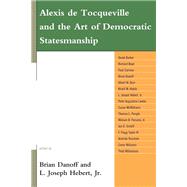Alexis De Tocqueville and the Art of Democratic Statesmanship
, by Danoff, Brian; Hebert, L. Joseph; Barker, Derek; Boyd, Richard; Carresse, Paul; Danoff, Brian; Dzur, Albert W.; Habib, Khalil M.; Hebert, L Joseph, Jr.; Lawler, Peter Augustine; McWilliams Barndt, Susan; Pangle, Thomas L.; Parsons, William B., Jr.; Schaff- ISBN: 9780739145296 | 0739145290
- Cover: Hardcover
- Copyright: 12/13/2010
In 1835, Alexis de Tocqueville famously called for 'a new political science' that could address the problems and possibilities of a 'world itself quite new.' For Tocqueville, the democratic world needed not just a new political science but also new arts of statesmanship and leadership. In this volume, Brian Danoff and L. Joseph Hebert, Jr., have brought together a diverse set of essays revealing that Tocqueville's understanding of democratic statesmanship remains highly relevant today. The first chapter of the book is a new translation of Tocqueville's 1852 address to the Academy of Moral and Political Sciences, in which Tocqueville offers a profound exploration of the relationship between theory and practice, and between statesmanship and political philosophy. Subsequent chapters explore the relationship between Tocqueville's ideas on statesmanship, on the one hand, and the ideas of Plato, Aristotle, Machiavelli, Montesquieu, the Puritans, the Framers of the U.S. Constitution, Oakeshott, Willa Cather, and the Second Vatican Council, on the other. Timely and provocative, these essays show the relevance of Tocqueville's theory of statesmanship for thinking about such contemporary issues as the effects of NGOs on civic life, the powers of the American presidency, the place of the jury in a democratic polity, the role of religion in public life, the future of democracy in Europe, and the proper balance between liberalism and realism in foreign policy.






